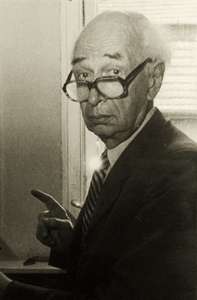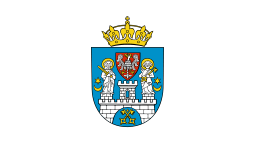Zygmunt Ziembiński
Zygmunt Ziembiński OPR (1 June 1920 – 19 May 1996), usually cited as Z. Ziembinski, was a Polish legal philosopher, and one of the most prominent theoreticians of law in Poland in the second half of the 20th century.[2] He was Professor of Jurisprudence at the Adam Mickiewicz University and chaired its Department of Legal Theory and Philosophy of Law. His most famous work is Basic Problems of Jurisprudence (1980).[3]
Zygmunt Ziembiński | |
|---|---|
 | |
| Born | Zygmunt Ziembiński June 1, 1920 |
| Died | May 19, 1996 (aged 75) |
| Nationality | Polish |
| Citizenship | Polish |
| Alma mater | University of Poznań (LL.D., 1949) |
| Known for |
|
| Scientific career | |
| Fields | law, logic, philosophy of law, sociology of law |
| Institutions | Adam Mickiewicz University (1946–1996) |
| Thesis | Procesy o zniewagę jako problem techniki społecznej. (Defamation trials as a problem of social technology) (1949) |
| Doctoral advisor | Czesław Znamierowski |
| Doctoral students | |
| Other notable students |
|
| Influences | |
| Influenced | derivative theory of legal interpretation |
| Signature | |
Biography
Early life
Ziembiński was born in 1920, as the son of Maria Romiszewska and Zygmunt Sr., in Poland's capital, Warsaw. His father had a doctorate in psychology and worked as Director of Libraries of the Ministry of Religious Affairs and Public Education; his mother was a painter. He was educated at the Stanislaus Kostka Gymansium in Warsaw (1938).[4]
During his sophomore year of college, at the outset of the Second World War, Ziembiński enlisted in the Home Army resistance movement, then received a commission as podporucznik in the 27th Home Army Infantry Regiment. He saw much action, taking part in the Silent Unseen's Operation Freston (1945).[4]
Academic career
In 1947, he graduated in law from University of Poznań's Faculty of Law and Administration, having written Master of Jurisprudence (M.Jur.) thesis under the supervision of Czesław Znamierowski, who introduced Ziembiński to the field of legal theory and convinced him to major in the subject. In 1949 he completed his Master of Philosophy (M.Phil.) degree in sociology at the University of Poznań under the supervision of Kazimierz Ajdukiewicz. In 1949 he obtained a Doctor of Law (LL.D.) degree, writing a dissertation on the defamation tirals and social technology. He was awarded his docent position in 1955, and the professor ordinarius title in 1970. Additionally, in 1958, Ziembiński studied at the European University Centre, Nancy, France.[4]
Ziembiński belongs to the Poznań school of legal theory and is known for developing a theory of law defined as a theory of legal phenomena, which covered both logical-linguistic as well as real aspects of law. The theory served as a base for the development of so-called normative concept of sources of law.[5][2] Ziembiński defined law as a system of norms of conduct distinguishable from other social norms by determined formal features.[6] Another ideas suggested by him were the differentiation between a legal norm and a legal provision, as well as the conception of two coupled norms and the notion of a norm of competence.[7]
He was a member of the Polish Philosophical Society, Polish Sociological Association, Poznań Society for the Advancement of Arts and Sciences, International Association for the Philosophy of Law and Social Philosophy (IVR) and served as a vice president of the International Association of Legal Methodology.[4]
In 1991, Ziembiński became a corresponding member of the Polish Academy of Sciences.
Honours and awards




References
- Grabowski, Paweł (2009). "Enactment, provision, norm: reflections on the normativeness of provisions regulating the process of legislation". Investigationes Linguisticae. XVII: 129–140.
- Kordela, Marzena (July 15, 2018). "Theory of Law by Zygmunt Ziembiński". Filozofia Publiczna i Edukacja Demokratyczna - Public Philosophy and Democratic Education. 4(1): 230–249.
- Grabowski, Andrzej (2013-06-24). Juristic Concept of the Validity of Statutory Law: A Critique of Contemporary Legal Nonpositivism. Springer Science & Business Media. p. 583. ISBN 978-3-642-27688-0.
- "Zygmunt Ziembiński's Obituary (in Polish)" (PDF). Ruch Prawniczy, Ekonomiczny i Socjologiczny - Journal of Law, Economics and Sociology. 2: 183–186. 1996.
- Pattaro, Enrico; Roversi, Corrado (2016-07-13). A Treatise of Legal Philosophy and General Jurisprudence: Volume 12 Legal Philosophy in the Twentieth Century: The Civil Law World, Tome 1: Language Areas, Tome 2: Main Orientations and Topics. Springer Science & Business Media. ISBN 9789400714793.
- Kordela, Marzena (2020-06-23). "Zygmunt Ziembiński and his Analytical Theory of Law: Formalization of Law as an Instrument to Protect its Minimal Moral Content". Review of Central and East European Law. 45 (2–3): 268–280. doi:10.1163/15730352-bja10006. ISSN 1573-0352.
- Smolak, Marek (2011). Handbook of Polish Law. Warsaw: Polish Scientific Publishers PWN. pp. 73–74. ISBN 978-83-262-0987-1.
- "Nagroda Naukowa 1996 - Poznan.pl". www.poznan.pl (in Polish). Retrieved 2020-07-10.